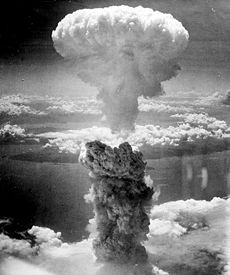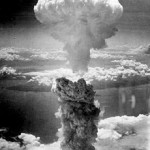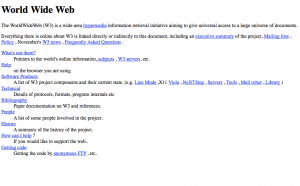Strange coincidence: The two technologies that influenced my life the most were born on the same day. As me.
On August 6, 1945, the first atomic bomb attack was unleashed on Hiroshima. Nuclear weaponry, and the stranger-than-fiction doctrine of Mutually Assured Destruction, was one of my first sustained intellectual interests. I remember a presentation in a 10th grade essay contest on “How to Survive a Nuclear War for Less Than $10,000” (it lost to an elucidation of the joys of stamp collecting, my first taste of intellectual martyrdom). I volunteered for UCSC’s Nuclear Policy Program (run by this guy) as an undergrad, and became a bit of an expert on tactical and battlefield nuclear weapons. I dragged my wife to Cold War locations around the country–Oak Ridge, Los Alamos, the Titan missile silo in Arizona, even the first nuclear power plant in Idaho. Thank goodness the Trinity detonation site in New Mexico is only open twice a year, or I would have dragged her there too.
On August 6, 1991, the first website was published. The Internet in general, and the Web in particular, were the technologies that elevated my childhood obsessions with TRS-80 pocket computers, VIC-20s, and Apple IIs to the level of world-changing forces. I signed up for my Ph.D. in Computers, Organizations, Policy, and Society at UCI a few years before the Web began, but by the time I left the Internet was open to everyone, and the Web was big money. My Ph.D. work was still pre-Web (ethnographies of manufacturing information systems being the hottest topic I could think of in those ancient times), but then moved on to mobile technology, open technology, and my current obsessions with online business. Launching a new website to 2 billion+ people still gives me a thrill, and showing others how to do it is one of my most satisfying teaching tasks.
As all early historians and players of Civilization know, for human society in the long run it’s always about technology–the Stone Age, the Bronze Age, the Industrial Age, etc. Digital technology dominates and shapes our world, through globalization, financial markets, social networks, and surveillance, with a force even greater than nuclear technology in its day. As I get older, I think more about how digital technology supports, and could possibly change, the most powerful human institution for shaping our future: for-profit business.
When I was a kid reading my International Herald Tribune from cover to cover, or writing my Model United Nations resolutions, I didn’t have an inkling of the kind of societal challenges we’d face in the United States–environmental unsustainability, a threatened middle class, corruption of the democratic process, financial speculation, and perpetual warfare to name a few. When the Cold War finished, I too thought it might be the End of History. Incorrect.
On August 6, 2011, I spent the day hiking in the Mokelumne Wilderness. Not that long ago, at least part of our society was wise enough to realize there are places where technology (and business) shouldn’t apply. I wonder if our society is wise enough today to make those decisions. Maybe it’s darkly appropriate that my spouse gave me Vonnegut’s Slapstick, or Lonesome No More to read on my birthday, an autobiography of the future last President of the United States.
Happy birthday to me.



Hi JP,
just wanted to say happy belated birthday. You have really interesting ideas on your blog, I’ll definitely read it more often.